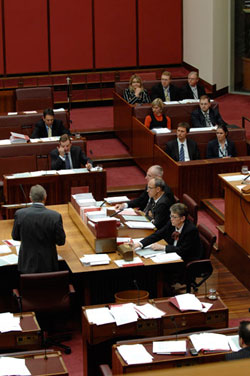12 Temporary Chairmen
The President shall nominate at the commencement of each Parliament a panel of not less than 2 senators who may act as Temporary Chairmen of Committees when requested so to do by the Chairman of Committees, or when the Chairman of Committees is absent.
Amendment history
Adopted: 19 August 1903 as part of SO 31
Amended:
- 5 October 1922, J.107 (separated from SO 31 and renumbered as SO28A)
- 2 December 1965, J.427) (to take effect 1 January 1966) (changes in terminology and timing)
1989 revision: Old SO 31 renumbered as SO 12
Commentary

Senator Ruth Coleman (ALP, WA) who famously retorted 'I have no sex in this position' when a senator stumbled over the correct form of address (Source: Commonwealth Parliamentary Handbook)
Originally part of old SO 31 which provided for the President to be relieved in the chair by the Deputy President, the purpose of this standing order was to provide relief for the latter. It was amended on the motion of President Baker before adoption to add the final phrase, “or when the Chairman of Committees is absent”.[1] This was done to extend the circumstances in which temporary chairmen could act by covering absences of the Deputy President as well as by direct request.
A tidying up exercise was undertaken by the Standing Orders Committee in 1965. These changes had effect from 1 January 1966 and occasioned a reprinting of the volume of standing orders, the first since 1937. Replacement of the term “Session” with “Parliament” in old SO 28A was one of several such timing changes recommended by the committee. Prorogation during the life of a parliament was to become the exception rather than the norm from the 1960s and, in any case, as the committee noted, nothing was gained by nominating the panel on a sessional basis and “it would be more convenient if the panel were appointed for the duration of each Parliament”.[2]

Proceedings in committee of the whole on the NATION-Building Funds Bill 2008, 4 December 2008, presided over by temporary chair of committees, Senator Guy Barnett (Lib, Tas) (Photo courtesy of AUSPIC)
At the beginning of each Parliament, the President appoints a panel of temporary chairmen by warrant which is tabled in the Senate. For many years the panel has comprised between 12 and 14 senators representing major and minor parties. Additions to the panel are made by further warrant and departures are now dealt with by the President issuing a warrant revoking an earlier appointment. In times past, the President reported receipt of letters from senators resigning as temporary chairmen of committees and no action was taken other than to remove their names from the list of temporary chairs appearing in each day’s Notice Paper.[3] The composition of the panel is entirely within the President’s prerogativeal though, in practice, parties make nominations, as for other appointments. The number and distribution of appointments has remained relatively stable for many years.
In practice, the President and Deputy President take the chair at particular times each day and temporary chairmen occupy the chair at the remaining times at the request of the Deputy President in accordance with a roster prepared in advance of each sitting fortnight. The Deputy President usually takes the chair during a division in committee and also chairs more complex committee proceedings, as well as being generally available to take bills into the committee stage, where possible, before handing over to a temporary chairman.
The President must take the chair if he or she is in the chamber unless, of course, the Senate is in committee of the whole.[4] Although there has been no specific ruling, the principle is also taken to apply to the Deputy President if he or she is in the chamber during a committee of the whole. The contrary practice was observed during Edwards’ day and the Chairman of Committees was not automatically required to be in the Chair in committee of the whole if in the chamber.The 1938 MS notes that this was to allow the Chairman of Committees to address the committee “or to give him [sic.] a rest”.[5]